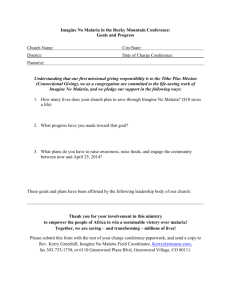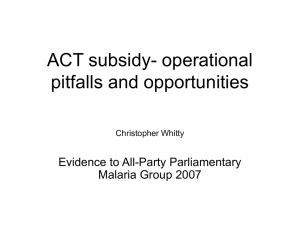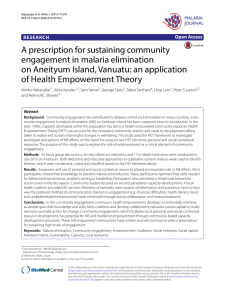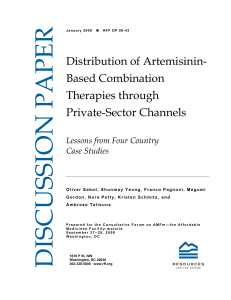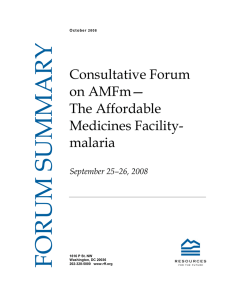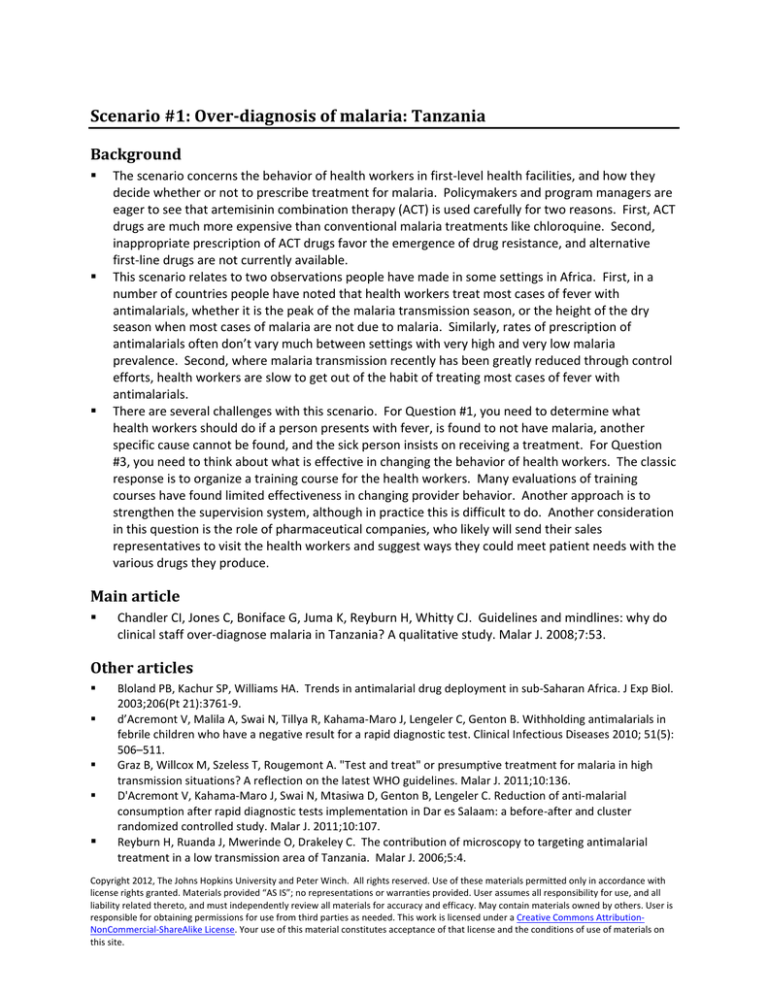
Scenario #1: Over-­diagnosis of malaria: Tanzania Background
The scenario concerns the behavior of health workers in first-­‐level health facilities, and how they decide whether or not to prescribe treatment for malaria. Policymakers and program managers are eager to see that artemisinin combination therapy (ACT) is used carefully for two reasons. First, ACT drugs are much more expensive than conventional malaria treatments like chloroquine. Second, inappropriate prescription of ACT drugs favor the emergence of drug resistance, and alternative first-­‐line drugs are not currently available. This scenario relates to two observations people have made in some settings in Africa. First, in a number of countries people have noted that health workers treat most cases of fever with antimalarials, whether it is the peak of the malaria transmission season, or the height of the dry season when most cases of malaria are not due to malaria. Similarly, rates of prescription of antimalarials often don’t vary much between settings with very high and very low malaria prevalence. Second, where malaria transmission recently has been greatly reduced through control efforts, health workers are slow to get out of the habit of treating most cases of fever with antimalarials. There are several challenges with this scenario. For Question #1, you need to determine what health workers should do if a person presents with fever, is found to not have malaria, another specific cause cannot be found, and the sick person insists on receiving a treatment. For Question #3, you need to think about what is effective in changing the behavior of health workers. The classic response is to organize a training course for the health workers. Many evaluations of training courses have found limited effectiveness in changing provider behavior. Another approach is to strengthen the supervision system, although in practice this is difficult to do. Another consideration in this question is the role of pharmaceutical companies, who likely will send their sales representatives to visit the health workers and suggest ways they could meet patient needs with the various drugs they produce. Main article
Chandler CI, Jones C, Boniface G, Juma K, Reyburn H, Whitty CJ. Guidelines and mindlines: why do clinical staff over-­‐diagnose malaria in Tanzania? A qualitative study. Malar J. 2008;7:53. Other articles
Bloland PB, Kachur SP, Williams HA. Trends in antimalarial drug deployment in sub-­‐Saharan Africa. J Exp Biol. 2003;206(Pt 21):3761-­‐9. d’Acremont V, Malila A, Swai N, Tillya R, Kahama-­‐Maro J, Lengeler C, Genton B. Withholding antimalarials in febrile children who have a negative result for a rapid diagnostic test. Clinical Infectious Diseases 2010; 51(5): 506–511. Graz B, Willcox M, Szeless T, Rougemont A. "Test and treat" or presumptive treatment for malaria in high transmission situations? A reflection on the latest WHO guidelines. Malar J. 2011;10:136. D'Acremont V, Kahama-­‐Maro J, Swai N, Mtasiwa D, Genton B, Lengeler C. Reduction of anti-­‐malarial consumption after rapid diagnostic tests implementation in Dar es Salaam: a before-­‐after and cluster randomized controlled study. Malar J. 2011;10:107. Reyburn H, Ruanda J, Mwerinde O, Drakeley C. The contribution of microscopy to targeting antimalarial treatment in a low transmission area of Tanzania. Malar J. 2006;5:4. Copyright 2012, The Johns Hopkins University and Peter Winch. All rights reserved. Use of these materials permitted only in accordance with license rights granted. Materials provided “AS IS”; no representations or warranties provided. User assumes all responsibility for use, and all liability related thereto, and must independently review all materials for accuracy and efficacy. May contain materials owned by others. User is responsible for obtaining permissions for use from third parties as needed. This work is licensed under a Creative Commons Attribution-­‐
NonCommercial-­‐ShareAlike License. Your use of this material constitutes acceptance of that license and the conditions of use of materials on this site.

